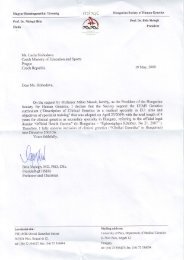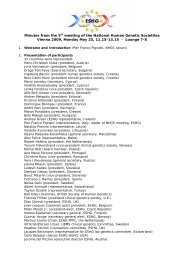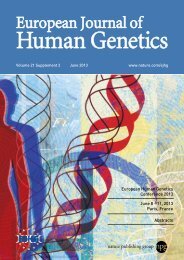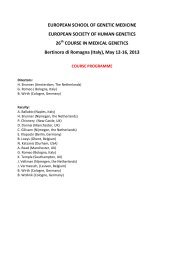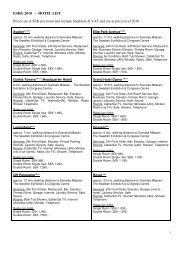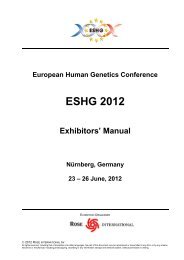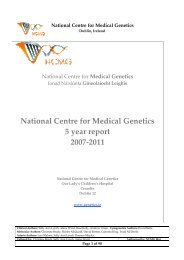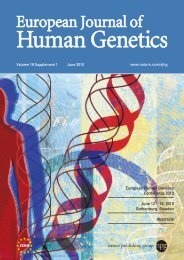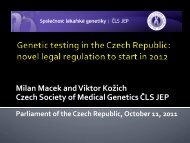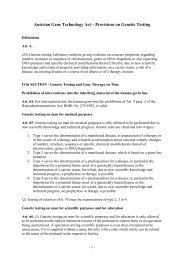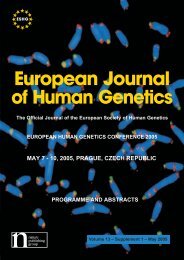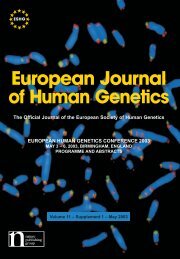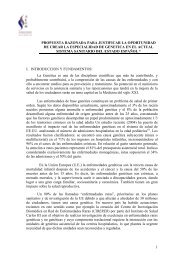2008 Barcelona - European Society of Human Genetics
2008 Barcelona - European Society of Human Genetics
2008 Barcelona - European Society of Human Genetics
Create successful ePaper yourself
Turn your PDF publications into a flip-book with our unique Google optimized e-Paper software.
Cancer genetics<br />
Mutation screening was performed by SSCP and CSCE in genomic<br />
DNA from 256 HNPCC index cases and 239 controls . Haplotyping<br />
was performed analysing 4 MSH2 extragenic microsatellite markers<br />
(D2S288, D2S2227, D2S1247 and D2S1248) in 50 controls and mutation<br />
carriers by using the PHASE program . We analysed the effect <strong>of</strong><br />
the mutation in mRNA processing by RT-PCR and in MSH2 expression<br />
by qRT-PCR using RNA from 5 mutation carriers and 18 controls .<br />
None <strong>of</strong> the remaining HNPCC cases or controls analysed harboured<br />
the mutation. We identified a common telomeric haplotype and two<br />
centromeric haplotypes, both rare in our population . Although we were<br />
not able to identify any abnormal transcript by RT-PCR with the design<br />
used, we observed a 50% reduction <strong>of</strong> mRNA MSH2 expression in<br />
carriers when compared with controls .<br />
Haplotype analyses suggest a founder effect <strong>of</strong> the c .[2635-3T>C;<br />
2635-5C>T] MSH2 mutation and expression studies support a pathogenic<br />
role <strong>of</strong> this mutation .<br />
P04.025<br />
Biallelic mUtYH germline mutations and endometrial cancer<br />
R. Tricarico 1 , B. Ciambotti 1 , P. Bet 2 , C. Di Gregorio 3 , L. Varesco 2 , M. Genuardi 1 ;<br />
1 Department <strong>of</strong> Clinical Pathophysiology, Medical <strong>Genetics</strong> Unit, University <strong>of</strong><br />
Florence, Florence, Italy, 2 Center for Hereditary Tumours, National Institute<br />
for Cancer Research, Genoa, Italy, 3 Division <strong>of</strong> Pathology, Hospital <strong>of</strong> Carpi,<br />
Modena, Italy.<br />
MAP (MUTYH-Associated Polyposis) is an autosomal recessive condition<br />
predisposing to colorectal cancer, due to inherited defects <strong>of</strong> the<br />
MUTYH gene causing an excess <strong>of</strong> somatic G>T mutations in the APC<br />
and KRAS genes . To date, few extracolonic manifestations have been<br />
observed in MAP patients, and the clinical spectrum <strong>of</strong> this condition<br />
is not yet fully established . Recently, one patient with a diagnosis <strong>of</strong><br />
endometrial cancer and biallelic MUTYH germline mutations has been<br />
described (Barnetson et al ., Clin Genet 2007: 72: 551-555) . However,<br />
it is not yet clear if biallelic germline mutations in MUTYH increase<br />
the risk <strong>of</strong> endometrial tumours . We report on two MAP patients with<br />
biallelic MUTYH germline mutations who developed endometrial carcinoma<br />
. In one <strong>of</strong> the patients, a diagnosis <strong>of</strong> Lynch syndrome was originally<br />
considered, and subsequently ruled out by immunohistochemical<br />
analysis <strong>of</strong> mismatch repair proteins and microsatellite instability<br />
analysis . The endometrial tumours were evaluated for PTEN, PIK3CA,<br />
KRAS, BRAF and CTNNB1 mutations . A G>T transversion at codon 12<br />
<strong>of</strong> the KRAS gene was observed in one tumor . A single 1-bp frameshift<br />
deletion <strong>of</strong> PTEN was observed in the same sample . Overall, these results<br />
suggest that endometrial carcinoma may represent a component<br />
manifestation <strong>of</strong> MAP .<br />
P04.026<br />
Gene conversion rates between Pms2, a mismatch repair gene<br />
involved in Lynch syndrome, and its pseudogene Pms2cL;<br />
impact on the reliability <strong>of</strong> current mutation scanning<br />
H. M. van der Klift 1 , C. M. Tops 2 , E. C. Bik 2 , M. W. Boogaard 2 , K. Pavlikova 3 , H.<br />
Morreau 4 , P. Devilee 1,4 , J. T. Wijnen 1,2 ;<br />
1 Department <strong>of</strong> <strong>Human</strong> <strong>Genetics</strong>, LUMC, Leiden, The Netherlands, 2 Department<br />
<strong>of</strong> Clinical <strong>Genetics</strong>, LUMC, Leiden, The Netherlands, 3 Institute <strong>of</strong> biology<br />
and medical genetics, University Hospital Motol, Praha, Czech Republic, 4 Department<br />
<strong>of</strong> Pathology, LUMC, Leiden, The Netherlands.<br />
Mutation detection in PMS2, a Mismatch Repair gene involved in<br />
Lynch syndrome (formerly Hereditary Non Polyposis Colorectal Cancer<br />
or HNPCC), is complicated by the presence <strong>of</strong> the pseudogene<br />
PMS2CL . It has been shown that gene conversion can occur between<br />
the 3’ part <strong>of</strong> PMS2 and this 700 kb proximally located pseudogene .<br />
We investigated 83 familial colorectal cancer cases and 25 healthy<br />
controls by semi-quantification <strong>of</strong> paralogous sequence variants (nucleotides<br />
that differ between PMS2 and PMS2CL) in sequence chromatograms<br />
<strong>of</strong> non-specific PCR products (amplification <strong>of</strong> PMS2 and<br />
PMS2CL sequences simultaneously) and show that, from exon 12 onwards,<br />
all PMS2 specific nucleotides on which commonly used MLPA<br />
and PMS2 specific PCR primers are based, can be subject to gene<br />
conversion with an increasing frequency <strong>of</strong> up to 50 % at the 3’ end <strong>of</strong><br />
the gene . Current mutation scanning designs are thus extremely prone<br />
to generate false-negatives or even worse false-positives in this part<br />
<strong>of</strong> the gene .<br />
With a newly developed protocol including non-specific sequencing,<br />
cDNA analysis and Southern Blot analysis that excludes false-nega-<br />
tive and false-positive results due to gene conversion events, we<br />
scanned colorectal cancer patients including strong candidates for a<br />
PMS2 germline mutation based on immunohistochemistry analysis<br />
<strong>of</strong> their tumours . We show that several mutations detected in the 3’<br />
part <strong>of</strong> PMS2 using the current mutation scanning designs are actually<br />
false-positives and that also mutations can be missed .<br />
P04.027<br />
screening for genomic rearrangements <strong>of</strong> the MMR and APC<br />
genes in Galician families with hereditary colorectal cancer<br />
C. Fernández-Rozadilla 1 , N. Gómez-Fernández 1 , I. Madrigal 2 , O. Lortes 1 , M.<br />
Mila 2 , M. Magdalena 1 , S. Castellví-Bel 3 , A. Vega 1 , A. Castells 3 , A. Carracedo 1 ,<br />
C. Ruiz-Ponte 1 ;<br />
1 Fundación Pública Galega de Medicina Xenomica-SERGAS, Grupo de Medicina<br />
Xenomica-USC, CIBER-ER, Santiago de Compostela, Spain, 2 Biochemistry<br />
and Molecular <strong>Genetics</strong> Department, Hospital Clínic, CIBER-ER, IDIBAPS, <strong>Barcelona</strong>,<br />
Spain, 3 Department <strong>of</strong> Gastroenterology, Institut de Malalties Digestives<br />
i Metabòliques, Hospital Clínic, CIBEREHD, IDIBAPS, <strong>Barcelona</strong>, Spain.<br />
Lynch syndrome and Familial Adenomatous Polyposis (FAP) are two<br />
well-known inherited colorectal cancer syndromes caused by germline<br />
mutations in susceptibility genes (MMR, APC, MYH) . Molecular diagnosis<br />
has until very recently relied only on detection <strong>of</strong> germline point<br />
mutations in these genes . Nevertheless, it is known that large rearrangements<br />
also play an important role in pathogenesis and should<br />
therefore be considered .<br />
Thirty-nine FAP and 16 Lynch syndrome unrelated Galician families<br />
that were negative for germlime mutations were analysed by MLPA<br />
to determine the frequency <strong>of</strong> large rearrangements . Positive results<br />
were further confirmed by other methods (FISH, cDNA analysis).<br />
Three different deletions in APC were detected in 4 families (8% <strong>of</strong> the<br />
total APC families): an exon 4 deletion, an exon 1-15 deletion, and two<br />
whole gene deletions . Carriers <strong>of</strong> whole allelic deletions presented a<br />
severe polyposis phenotype with an early onset <strong>of</strong> symptoms .<br />
In Lynch syndrome families, 3 deletions where found in MSH2 (exon 7-<br />
16, exon 2-3 and one whole gene deletion), whereas only one deletion<br />
was found in MLH1 (exon 4-6), making up to 14% (10% MSH2 and 4%<br />
MLH1) <strong>of</strong> the Lynch syndrome germline mutations . Large rearrangements<br />
were mainly detected in families fulfilling Amsterdam criteria.<br />
The overall results resemble those previously published in other populations<br />
and confirm that large rearrangements represent an important<br />
percentage <strong>of</strong> FAP and Lynch syndrome germline mutations . They<br />
should therefore be taken into account in molecular genetic testing <strong>of</strong><br />
Galician families .<br />
P04.028<br />
New germline mutations <strong>of</strong> the MLH mismatch repair gene in<br />
brazilian hereditary non-polyposis colorectal cancer<br />
M. V. Dominguez 1 , E. S. Monteiro 2 , D. M. Carraro 1 , B. M. Rossi 2 ;<br />
1 Laboratory <strong>of</strong> Genomic and Molecular Biology <strong>of</strong> Treatment and Investigation<br />
Center <strong>of</strong> Hospital A.C.Camargo, São Paulo, Brazil, 2 Department <strong>of</strong> Pelvic<br />
Surgery <strong>of</strong> Hospital A.C. Camargo, São Paulo, Brazil.<br />
Background: Hereditary non-polyposis colorectal cancer (HNPCC) is<br />
an autosomal dominant syndrome predisposing to the early development<br />
<strong>of</strong> various cancers including those <strong>of</strong> colon, rectum, endometrium,<br />
ovarium, small bowel, stomach and urinary tract . HNPCC is caused by<br />
germline mutations in the DNA mismatch repair genes, mostly MLH1<br />
and MSH2 . The mutation spectrum in the Brazilian population is still<br />
poorly documented .<br />
Aim: To report our experience on the mutation screening and investigation<br />
<strong>of</strong> the pathogenicity <strong>of</strong> the mutations . in MLH1 and MSH2 genes<br />
in 20 unrelated Brazilian kindreds with suspected HNPCC .<br />
Methods: Twenty brazilian patients with familial clustering <strong>of</strong> CRC<br />
were genetically tested. The families were identified by applying the<br />
Amsterdam and Bethesda Criteria . Point mutations in the MLH1 and<br />
MSH2 genes were screened by denaturing high performance liquid<br />
chromatography (DHPLC) followed by direct sequencing .<br />
Results: Two novel nonpathogenic mutations (2 <strong>of</strong> 20 [10%]) in MLH1exon<br />
15 (intron) nt . 1707 a->g and MLH1-exon 13 (intron) nt . 1632<br />
g->a were identified in brazilian CRC patients.<br />
Conclusion: According to the <strong>Human</strong> Gene Mutation Database (HGMD)<br />
and the International <strong>Society</strong> <strong>of</strong> Gastrointestinal Hereditary Tumors<br />
(InSIGHT) Database, this is the first report <strong>of</strong> this mutation.



